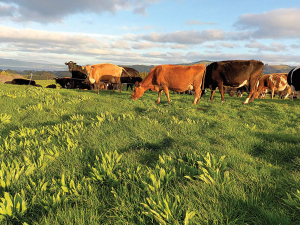DairyNZ opens applications for associate director role
DairyNZ is giving New Zealand farmers a unique opportunity to gain hands-on governance and leadership experience within the dairy sector.
 Plantain is a low-cost option to achieve significant reductions in N leaching without impacting the farm system.
Plantain is a low-cost option to achieve significant reductions in N leaching without impacting the farm system.
DairyNZ says its plantain programme continues to deliver promising results, with new data confirming that modest levels of plantain in pastures reduce nitrogen leaching, offering farmers a practical, science-backed tool to meet environmental goals.
With three years now complete, preliminary findings from the Lincoln University farmlet trial show 26% reduction in nitrate (N) leaching with an average of 17% Ecotain plantain in the pasture. Results from the Massey farmlet trial show over four years, N leaching was reduced on average by 26% where Ecotain plantain made up an average 25% in the pasture.
Monitoring on four mid-Canterbury farms shows that an average of 10-15% plantain across the whole farm is achievable by including plantain as part of the seed mix at pasture renewal and by broadcasting seed across the whole farm with fertiliser. The highest levels (20-40% plantain) are achieved in new swards 1-2 years after establishment.
The programme continues to show that plantain is a low-cost option to achieve significant reductions in N leaching without impacting the farm system, explains Kate Fransen, DairyNZ's plantain programme lead.
"Nitrogen leaching is an issue for many dairy catchments, so we need practical, affordable solutions. Including plantain in your pasture is 'low-hanging fruit' for reducing N leaching - and we now know you don't need to have 30% plantain in your pasture to have the positive effect.
"Research shows that 17% plantain across the farm is enough to make a sizeable difference to N leaching, and that between 10 and 20% plantain across the farm is achievable and practical for many farmers," she says.
The final year of data collection is underway at the Lincoln site, while at Massey data collection is complete and final analysis is underway. The programme now turns its focus to adoption of plantain in targeted N sensitive catchments.
The World Wide Sires National All Day Breeds Best Youth Camp Best All Rounder plaudit has become family affair, with 2026 Paramount Cup winner Holly Williams following in her sister Zara's footsteps.
DairyNZ is giving New Zealand farmers a unique opportunity to gain hands-on governance and leadership experience within the dairy sector.
Herd improvement company LIC has posted a 5.2% lift in half-year revenue, thanks to increasing demand for genetics.
According to the latest Fresh Produce Trend Report from United Fresh, 2026 will be a year where fruit and vegetables are shaped by cost pressures, rapid digital adoption, and a renewed focus on wellbeing at home.
The Roar is a highlight of the game hunting calendar in New Zealand, with thousands of hunters set to head for the hills to hunt male stags during March and April.
OPINION: The past few weeks have been tough on farms across the North Island: floods and storms have caused damage and disruption to families and businesses.
OPINION: Fonterra may be on the verge of selling its consumer business in New Zealand, but the co-operative is not…
OPINION: What does the birth rate in China have to do with stock trading? Just ask a2 Milk Company.